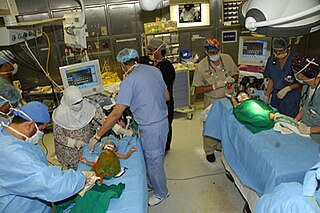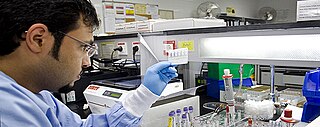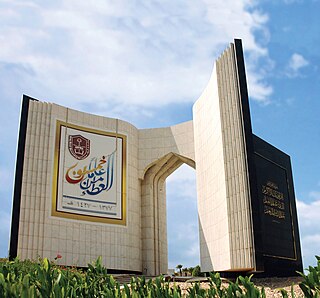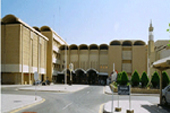
King Saud University is a public university in Riyadh, Saudi Arabia. Established in 1957 by King Saud bin Abdulalziz to address the country's skilled worker shortage, it is the first university in Saudi Arabia. It was known as Riyadh University from 1964 until it was reverted to its inceptive name in 1982. It was converted into an independent non-profit academic institution in 2023.

Imam Mohammad Ibn Saud Islamic University (IMSIU) (Arabic: جامعة الإمام محمد بن سعود الإسلامية), commonly known as Al-Imam University, is a public university in the sub-municipality of Shemal in Riyadh, Saudi Arabia. It was founded in 1950 as an Islamic seminary by Muhammad ibn Ibrahim ash-Sheikh, the first Grand Mufti of Saudi Arabia. It was renamed the College of Sharia in 1953, before becoming a full-fledged university through amalgamations of other colleges and assuming its current name in 1974. The university also has overseas presence in Indonesia and Djibouti.
Chinook Regional Hospital is the district general hospital for the City of Lethbridge and Southern Alberta, and offers many of the health care services for Alberta Health Services. The hospital services a population of over 150,000 and is supported by the Chinook Regional Hospital Foundation.

Health care in Saudi Arabia is a national health care system in which the government provides free universal healthcare coverage through a number of government agencies. There is also a growing role and increased participation from the private sector in the provision of health care services.

Srirama Chandra Bhanja Medical College and Hospital, also known as S.C.B Medical College and Hospital, is a public medical college in Cuttack, Odisha, India. It is named after Sriram Chandra Bhanj Deo.

North Eastern Indira Gandhi Regional Institute of Health and Medical Sciences (NEIGRIHMS) is a medical institute of India in Shillong, Meghalaya. It is located on the outskirts of the educational hub hills City of the Northeastern India, Shillong, the "Scotland of the East". The present full-fledged tertiary care hospital facilities started at its permanent campus at Mawdiangdiang, Shillong in the year 2007. It is an Autonomous Institute under the Ministry of Health and Family Welfare, Govt. of India in 1987 and declared as "Centre of excellence" by the parliament of India. (1) The MBBS teaching programme of NEIGRIHMS started in 2008 with intake of 50 (fifty) students, followed by Post graduate courses in the following 4 subjects - Anaesthesiology, Microbiology, Obstetrics & Gynaecology and Pathology in the year 2009. Further PG courses have been started in the following subjects - Anatomy, General Medicine, General Surgery and Radiodiagnosis and Imaging. The Institute also offers DM course in Cardiology. Besides, there is B. Sc Nursing and M. Sc Nursing courses being run by the Institute's College of Nursing.The College of Nursing started its courses from the year 2006.

The Ministry of National Guard Health Affairs(MNG-HA) is a government-funded health system in the Kingdom of Saudi Arabia, founded in 1983. It is affiliated with the Ministry of National Guard and the Saudi Arabian National Guard, consisting of medical cities spread in many regions.

King Khalid University is a public university in Abha, Saudi Arabia. Established in 1998, the university came to being through the merger of the satellite campuses of Imam Mohammad Ibn Saud Islamic University and King Saud University into one entity. It is named after King Khalid bin Abdulalziz, the ruler of Saudi Arabia from 1975 until 1982.

King Saud bin Abdulaziz University for Health Sciences(KSAU-HS) is a public university with its main campus in Riyadh, Saudi Arabia, and branch campuses in Jeddah and al-Mubarraz. It was established in 2005 by Crown Prince Abdullah bin Abdulaziz as an academic institute specializing health sciences and is named after King Saud bin Abdulaziz, the ruler of Saudi Arabia between 1953 and 1964.
King Saud Medical City (KSMC), also known as Shemaisi Hospital, is a large public district general hospital and Level 1 Trauma Center in Riyadh, Saudi Arabia. It was founded in 1956 and is one of the largest tertiary care centers in Saudi Arabia, with a total bed capacity of 1,500 including 200 ICU beds. The 102-bed emergency department is the busiest in the country, and the hospital serves as the largest referral center in Saudi Arabia for Orthopedic surgery, Trauma surgery and Neurosurgery. It is part of the first healthcare cluster in the city of Riyadh, and currently employs 9,200 healthcare personnel. The hospital has a tremendously high patient turnover, both outpatient and inpatient, and conducted over 20,000 surgical procedures in 2019 alone.

Guru Gobind Singh Medical College is a public medical college located in Faridkot, Punjab, India.

Jubilee Mission Medical College and Research Institute is a private, non-profit Christian minority medical college, hospital and research institute located at Thrissur in Kerala, India. The establishment is administered by the Jubilee Mission Hospital Trust, a charitable organization under the Catholic Archdiocese of Thrissur.

The University of Illinois Hospital & Health Sciences System is a member of the Illinois Medical District, one of the largest urban healthcare, educational, research, and technology districts in the USA. The University of Illinois Hospital & Health Sciences System itself is composed of the 485-bed University of Illinois Hospital, outpatient diagnostic and specialty clinics, and two Federally Qualified Health Centers (FQHCs) that serve as primary teaching facilities for the University of Illinois Chicago (UIC) Health Science Colleges. The eight-story inpatient facility provides patient care services from primary care through and including transplantation, with a medical staff in a variety of specialties. In 1999, the 245,000-square-foot (22,800 m2) Outpatient Care Center (OCC) opened with a fully computerized medical record system, allowing patient records to be accessible electronically. The OCC houses all subspecialty and general medicine outpatient services and the Women's Health Center.

Siddhartha Medical College is a medical college in Vijayawada, Andhra Pradesh. It provides undergraduate and graduate medical education in AP. It is located in Gunadala, Vijayawada, Andhra Pradesh.It is affiliated to Dr. YSR University of Health Sciences

King Saud University (KSU), founded in 1957, was the first university established in the history of Saudi Arabia. It was founded by King Saud bin Abdulaziz. The institute was renamed as Riyadh University by King Faisal bin Abdulalziz in 1964 but was reversed back to its original name in 1982 by King Khalid bin Abdulalziz. The university initially offered courses in arts, followed by science, business and pharmacy in 1960. By 1965, agriculture and engineering disciplines were also incorporated into the curriculum. The university was converted into an independent non-profit academic institution in 2023 by Crown Prince Mohammed bin Salman.

Prince Sultan Military Medical City (PSMMC) also known as Riyadh Armed Forces Hospital is located in Riyadh City, the capital of Saudi Arabia, considered one of the most advanced centres in the Middle East. It is located in the heart of Riyadh. At a distance of approximately 20 kilometres (12 mi) from the city centre and easily accessible to the general population. PSMMC is part of the Medical Services Department (MSD) of the Ministry of Defense (MOD).

Prince Sattam Bin Abdulaziz University was formerly known as Prince Salman Bin Abdulaziz University or the University of Al-Kharj. It is a Saudi University located in the city of Al-Kharj, Saudi Arabia. It is under the supervision of the Ministry of Higher Education Saudi Arabia and managed by the Rector of the University, Dr. Abdulaziz Abdullah Alhamid.

Government Mohan Kumaramangalam Medical College is a Tamil Nadu government medical college established in 1986. The college is in Salem, Tamil Nadu, India, and is named after former Iron and Steel Minister of India Mohan Kumaramangalam. It is recognised by the Medical Council of India. The school enrolls 100 MBBS and 102 postgraduate medical students. Government Mohan Kumaramangalam Nursing College is situated on the campus in a separate building.

King Abdulaziz Medical City is a district general hospital in Riyadh, Saudi Arabia; it was established by a royal decree in May 1983. With a bed capacity of 690 beds, it provides all types of care to all National Guard soldiers and their families, starting from primary health care up to tertiary specialized care. In 2012, It became a recognized center on the international level in conjoined twin separation surgery. It is the first center all over the world with 100% success rate in twin separation surgery.

King Faisal Hospital is a hospital in the Kacyiru area of the Rwandan capital, Kigali. It was established between 1987 and 1991 with the help of the Saudi Fund for Development (SFD). Being the largest referral hospital in Rwanda, King Faisal Hospital, Kigali, spreads over 7.9 hectares. It is located in an upscale area and has 18,000 square meters of floor space distributed over 4 floors and an extension building of 2,285 square meters of floor space. The hospital provides a range of highly specialized medical care, including the diagnosis of diseases and specialized treatment.

















